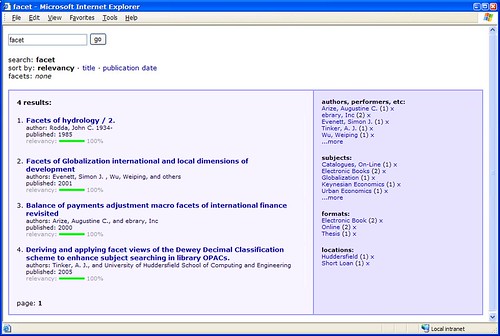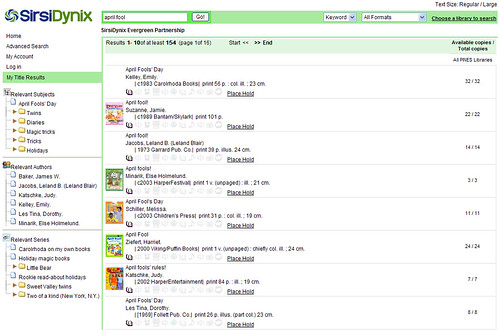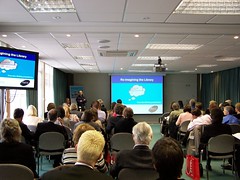Contrary to any speculation you might see on snopes.com, I haven’t been abducted by aliens, joined a monastery, or fallen down an open manhole cover — the last couple of months have been fairly hectic and although I’ve kept saying to myself “I must remember to blog about XYZ”, life just keeps throwing stuff in my way.
Anyway, this morning I found out that Casey Durfee has left the Seattle Public Library to become the latest employee of LibraryThing — specifically he’s going to be working on the LibraryThing for Libraries product.
I’ve lost count of the number of times I’ve added something to our OPAC or written a bit of code that I thought was new & cool only to find out that Mr Durfee had already done it.
I think I’m already on record as saying that if I lived in the USA, I’d camp outside Tim Spalding’s house with a large sign saying “Please let me work for LibraryThing! Will write code for coffee and peanuts!”. Come the day that LibraryThingGlobalHyperMegaCorpLtd opens its first UK office, I’ll be there with my sign.
So, with a huge amount of envy, I’d like to wish Casey all the best in his new job. I’d also like to thank him for the hundreds of helpful emails he’s sent to the IPAC and Horizon mailing lists over the last 6 years — there were many times when I seriously wondered if Casey knew more about how HIP worked than the developers at Dynix (and then SirsiDynix) did!
Category: Horizon/HIP
OPAC Survey results – part 8
Library and Information Show 2007
I’ve just about recovered from LiS 2007 and hopefully I didn’t cram too much into the 30 minutes I had for my session!
There’s a few photos from the event on Flickr…






OPAC Survey
I think the previous post will be the last batch of graphs unless I uncover something new in the data. Instead, many thanks to my colleague Lisa (Senior Assistant Librarian for Applied Sciences and Computing & Engineering) for sifting through the respondent comments for the common themes. The full figures will be in the report, but here’s a snifter of the “feature comments”…
The most common wanted feature was federated searching (both electronic resources and other libraries’ holdings), with over 30 responses.
Next up, being able to customise the OPAC (look & feel and adding new features), with over 15 comments.
Relevancy ranking was specifically mentioned by at least 10 respondents, with 9 wanting personal borrowing histories, Amazon style wish lists, and saved session results.
1 respondent wanted to be able to search by colour of cover and another wanted wiki style functionality adding to the OPAC.
For the “final comments” section, here’s a sample…
10 respondents felt that “2.0” style features could be a distraction and that the OPAC should be kept simple. Another 10 said that lack of staff expertise or money was stopping them from being able to make the changes they would like to their OPACs.
However, the most common theme was laying the blame squarely at the feet of the vendors — broken promises, slowness of feature delivery, etc.
Lisa also picked out a handful of the comments that she felt stood out and here’s just 3 of them…
It seems that OPACs are too busy trying to please every customer. They spend too much time developing and not nearly enough time releasing software. The ability of the library to customize the OPAC should be the primary feature. Developing extensive APIs and building in flexibility should be at the top of the list for development. Let librarians develop the specific tools they want or need. Allow librarians to create add-ons and templates and distribute them to other libraries. OPAC vendors need to concentrate on search technology and not the next great feature.
I think we should always keep in mind the key aim of the OPAC is so users can locate/access resources. These new web 2.0 type enhancements can be fantastic, but there is a danger in using them just because we think we should.
We took a risk in 2002 and extensively customized our OPAC outside the confines of vendor support. Our efforts have been extremely successful and it has essentially become our new model for the direction we’re heading in the future. We’ll be doing MORE customization and application development in the future, rather than less. We’re much more likely now to move away from traditional library automation vendors as we consider what comes next.
(Phil Feilmeyer, Hennepin County Library)
More Solr fun
Darn, I should have known I was following in a great man’s footsteps…
http://www.code4lib.org/2007/durfee
Anyway, a couple more hours of coding has resulted in this…
http://161.112.232.18/modperl/facet6.pl?q=medicine

Hopefully NCSU won’t be setting their lawyers on me (copying is the most sincere form of flattery!), but the prototype has certainly borrowed one or two ideas from their wonderful OPAC.
It’s still a way off being a full OPAC replacement and I need to shrink the book covers down to a more sensible size, but I’m quite chuffed with what I’ve been able to achieve in just a few hours of coding.
Arrghhhhh – Change!
I’m sure Stephen Abram posted his “Change — Arrghhhhh!” article with all of the best intentions in the world, but unfortunately it’s not gone down well with some of the customers…
I assure you, most of us handle change quite well and if none of us wanted major change we wouldn’t be upset about the decision to trash 8.0. In fact, we have asked, begged and demanded change for years and we finally thought we were about to get some. Instead that long awaited “change” has once again been flushed down the toilet.
I was reminded of a stern grownup telling a child that he must take his cod liver oil, because it’s good for him. And I might, if I thought the New Improved Cod Liver Oil had distinct advantages over the old cod liver oil I’ve been taking for years. Problem is, I’m not convinced.
…an incredibly insulting commentary
I also think the article on change has to rate as one of the most offensive and tasteless exercises in corporate public relations ever done.
I must admit that when I read the article, my initial reaction was “what on earth was Stephen thinking when he wrote it?”. Anyway, with a quick shrug of the shoulders, I went back to doing some more coding on the Solr OPAC and the subsequent release of endorphins made me feel much happier! 🙂
I’d definitely be interested to know what some of the Unicorn sites thought of the article.
SirsiDynix Rome Sweepstake #1 – EDIFACT
Will SirsiDynix Rome support the EDIFACT standard from day 1? The US office says “no” and “probably not”, whilst the UK office says “yes”.
For UK customers, EDIFACT is pretty much an essential requirement for running a library. In fact, I suspect most libraries outside of the US require it.
So, will the first release of Rome have EDIFACT or won’t it? As the US will be doing the development, I suspect the answer might be “no”, but I’m sure I’ll shortly receive another telephone call from the UK office to say “yes” (if only to even up the scores at two all).
SirsiDynix to build Rome OPAC on Evergreen
Finally some proof that the new management at SirsiDynix are listening to their customers! I really shouldn’t post this until SirsiDynix make the official announcement on Thursday, but I just have to spill the beans because I’m so excited about the news…
Since the announcement of Rome, many Dynix and Horizon sites have been discussing a move to open source systems (such as Koha and Evergreen) and it looks like the top brass at SirsiDynix have realised that “if you can’t beat them, join them” — on Thursday they’ll be announcing a partnership with the people at Georgia Public Library Service who develop the Evergreen system.
How did I find out about this? Well, a couple of years ago I was given access to the Dynix development website and I regularly check it to see what the company has in the software pipeline. Imagine my surprise when I spotted a link titled “Evergreen Partnership OPAC” this morning — what could I do but click to see what is was!

I honestly thought that SD staff might have put it on there as some kind of joke, but a quick phone call to the press office at Huntsville confirmed the news and also that the formal announcement would come before the end of the week. They did ask me to swear that I wouldn’t leak the news, but I had my fingers crossed at the time so it doesn’t count!!! 😀
This is really great news as the Evergreen OPAC has a host of features not currently available in most ILS vendor OPAC products (including facets and lots of cool AJAX stuff).
Revish and reviews
Just spotted that Revish are gearing up for launching at the end of March 🙂
On the blog, Dan mentions that the site will provide APIs for getting at the data and I can’t wait to see if we can do anything with that data in our OPAC.
I quietly flicked on the ability to add reviews and comment to our OPAC last week, but we’ve yet to have our first student generated comment. This has slightly surprised me (i.e. made my right eyebrow rise by about 3mm) as we’ve already had several hundred book ratings added in the last few weeks. However, adding a rating doesn’t require you to login but adding a comment does (at the request of our Librarians).
If we don’t get any bites soon, I’ll probably tweak the code to allow anonymous comments. These will need to be fully moderated, as it seems these days that any HTML <form> on a public web page will attract spam 🙁
However, it does raise some interesting questions:
- Is having to login to post comments too much of a barrier?
- Are public library users (e.g. those at AADL) more likely to post comments/reviews than students at an academic library?
- What motivates someone to write a review/comment?
- Have I finally managed to code an OPAC tweak that no-one will use?
- Did I leave the iron on?
Hey, whatcha lookin’ at?
Just for the heck of it, I’ve started logging details of the full bib pages displayed in the OPAC to get a feel for what are the most looked at books. Once we’ve got enough data, it’ll be interesting to cross reference that with the actual number of physical copies we own for each title and whether or not a copy was checked out shortly after it was looked at.
In the meantime, here’s another “wall of books” to feast your eyes on…
top 50 most looked at books on the OPAC in the last 7 days
(I don’t have 7 days of data yet, but not to worry!)
Heh – glad to see the following funky book made it into the initial top 50 🙂

What a day!
I’m finally back home, 15 hours after setting off at an unmentionable hour to travel down to the CILIP event in London today. I’m a creature of habit, and my habit is to wake up gradually at about 6:45am in the morning — getting up at 5am just doesn’t feel right 😀
I’m too knackered to write very much, but a big thank you to everyone involved for giving me the chance to show off some of our OPAC tweaks, and thanks to everyone who chatted to me or took one of my moo cards!
It was also great to finally meet Tim Hodson (Information Takes Over) in the flesh. Isn’t it weird meeting someone you’ve never seen before but whose blog you read on a regular basis? It might just be me, but UK library bloggers rarely seem to include a photograph of themselves. If I was to include a picture of myself, I’d choose this picture (which isn’t of me, but I like to pretend it might be because his name is “Davey” too)…

I thoroughly enjoyed all of the speakers today, but (am I allowed to pick a favourite?) I really really enjoyed Antony Brewerton‘s session — I can’t remember the last time I’ve laughed so much during a presentation!
I’ve uploaded the final version of my presentation to https://library.hud.ac.uk/cilip/ and there’s also a few photographs on Flickr (unfortunately I left my rucksack at the front of the room after my session, so I couldn’t take any photographs in the afternoon). If you’ve ever wanted to see what a sunrise over Huddersfield gasworks looks like, then you won’t be disappointed!!!

Horizon — the five stages of grief
Well, I finally passed through the “denial” stage yesterday evening (which was partly why I didn’t post the information I knew until the formal announcement), slipped in “anger” overnight (good job I can never remember my nightmares!), which I guess puts me firmly into the “bargaining” stage today…
I wonder if I rang up SirsiDynix and promised to be a nicer person or told them how much I love them, they might reconsider?
Unfortunately, this means I’ll either be in the “depression” or “acceptance” stage during my presentation at the CILIP: “Re-imagining the Library” Executive Briefing tomorrow.
I guess either is better than still being in the “anger” stage — 15 minutes of me on the stage shaking my fists at the heavens screaming “Why God? Why?!? Horizon 8.0 looked so beautiful with its funky Aqua style buttons! Take me instead!!! Wait a minute… Statue of Liberty? …that was our planet! You maniacs! You blew it up! Damn you! Damn you all to hell!” might well go down as a memorable presentation, but not in a “good” way.
Anyway, if nothing else, the upcoming European Conference in May is going to be extremely interesting — if you haven’t done so already, get your space booked now!